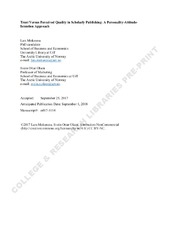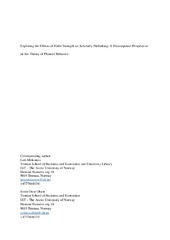Blar i forfatter "Moksness, Lars"
-
Exploring the effect of habit strength on scholarly publishing
Moksness, Lars; Olsen, Svein Ottar; Tuu, Ho Huy (Journal article; Tidsskriftartikkel; Peer reviewed, 2020-06-30)Purpose - This study aims to explore the role of habit strength in explaining intention and open access (OA) and non-OA scholarly publishing.<p> <p>Design/methodology/approach - A decomposed theory of planned behaviour (TPB) is used as the conceptual framework to investigate a sample of 1,588 researchers from the major universities in Norway. Different latent construct models are analysed with a ... -
Peer reviewing: a private affair between the individual researcher and the publishing houses, or a responsibility of the university?
Longva, Leif; Reierth, Eirik; Moksness, Lars; Smedsrød, Bård (Journal article; Tidsskriftartikkel; Peer reviewed, 2017)Peer reviewing is mandatory for scientific journals as quality control of submitted manuscripts, for universities to rank applicants for scientific positions, and for funding agencies to rank grant applications. In spite of this deep dependency of peer reviewing throughout the entire academic realm, universities exhibit a peculiar lack of interest in this activity. The aim of this article is to show ... -
Perceived quality and self-identity in scholarly publishing
Moksness, Lars; Olsen, Svein Ottar (Journal article; Tidsskriftartikkel; Peer reviewed, 2019-04-11)The purpose of the study was to understand if and how 2 proposed facets of self‐identity (work‐self and career‐self) and journals' perceived quality (impact, visibility, and content quality) influence and explain the intention to publish in open access (OA) or nonopen access (non‐OA) journals. This study integrates attitude and identity theory within a cross‐sectional survey design. The sample ... -
Trust versus perceived quality in scholarly publishing: A personality-attitude-intention approach
Moksness, Lars; Olsen, Svein Ottar (Journal article; Tidsskriftartikkel; Peer reviewed, 2017-10-01)Digital academic journals serve as the main dissemination method for peer-reviewed research articles. These journals can be divided into two main categories: open access (OA) and non– open access (non-OA) journals. OA literature is defined by Suber as “digital, online, free of charge, and free of most copyright and licensing restrictions.” The reasons why no-cost OA adoption is slow-going ... -
Understanding researchers’ intention and habit regarding publishing in open access journals
Moksness, Lars (Doctoral thesis; Doktorgradsavhandling, 2018-12-13)Scholarly publishing is the vessel for the dissemination of research articles. Contemporary scholarly publishing is achieved by two main models, open access (OA) and non-open access (non-OA). OA refers to articles that are available at no cost to the end-user; however, authors may incur a fee for accepted manuscripts. Non-OA articles are available at a cost, either via subscriptions or via individual ... -
Understanding researchers’ intention to publish in open access journals
Moksness, Lars; Olsen, Svein Ottar (Journal article; Tidsskriftartikkel; Peer reviewed, 2017-08)<i>Purpose</i> – The purpose is to understand how attitudes, norms (injunctive and descriptive), and perceived behavioral control (PBC) (capacity and autonomy) influence intention to publish Open Access (OA), and how personal innovativeness in information technology (PIIT) affects attitude and PBC.<p> <p><i>Design/methodology/approach</i> – This study employs an integrated and extended theory of ... -
Verbal Measure, or Graphic Measure, or Both? Psychometric Study of Organizational Identification
Moksness, Lars (Master thesis; Mastergradsoppgave, 2014-04-25)For å måle organisasjonsidentitet undersøkte dette forskningsprosjektet vitenskapelige ansatte ved et norsk universitet (N = 74), og ansatte i et norsk multinasjonalt selskap (N = 244). Tidligere forskning, rollen til sosial identitetsteori i organisasjonsidentitet, og en gjennomgang av målemetoder ble presentert. Data ble samlet inn med Identification with a Psychological Group Scale (IDPG) som ...


 English
English norsk
norsk





